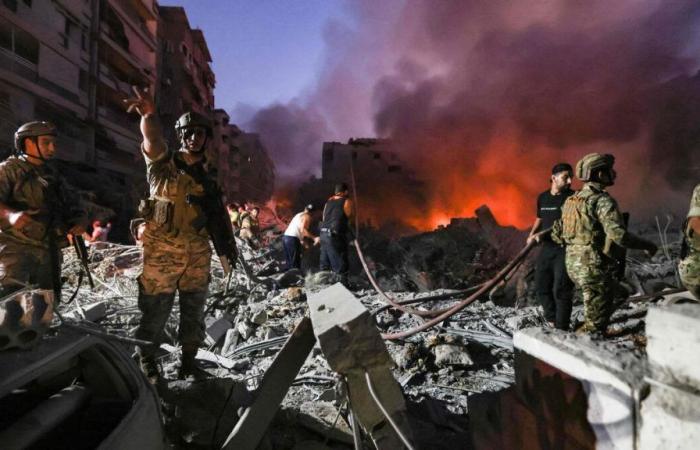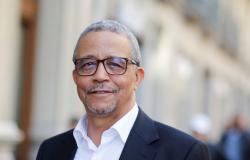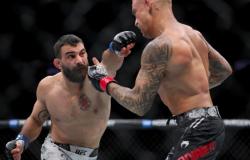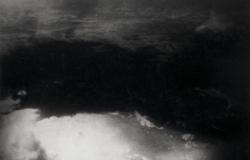
An air raid of a violence that Lebanon had not experienced since the 2006 war. Israel announced on Friday that it had carried out strikes on the “headquarters” of Hezbollah in Beirut, shortly after its Prime Minister, Benjamin Netanyahu, committed to the UN to continue hitting the pro-Iranian movement.
Six people were killed and 91 injured in these strikes, the Lebanese Ministry of Health announced shortly before midnight, specifying that rescuers were looking for possible survivors under the rubble.
What happened?
Moments after the end of the Israeli leader’s speech at the UN General Assembly, at 5:30 p.m. Paris time, the Israeli army carried out these new strikes against Hezbollah, then a “precise strike” on the ” headquarters” of the Shiite movement in the southern suburbs of Beirut.
Benyamin Netanyahu’s office released a photo showing him on the phone, giving, according to legend, the green light for this strike. In photos released by the Ministry of Defense, she is followed by the minister, Yoav Gallant and the army chiefs, at the Air Force headquarters.
Seven buildings were blown up by these strikes, according to the Al-Manar television channel, affiliated with Hezbollah. In the middle of the craters dug by the bombs, residents fled the area which is home to many apartment buildings, in a hurry, to the sound of ambulance sirens. Al-Manar said the piled-up rubble was hampering rescue teams’ efforts to find potential survivors.
Later in the evening, shortly before midnight, the Israeli army announced on Sunday evening that it would strike “in a short time” three Hezbollah arms depots hidden under buildings in southern Beirut. “The force of the explosions caused by the missiles under these buildings could cause damage or even collapse them,” said Rear Admiral Daniel Hagari. And the spokesperson for the Israeli army called on residents to evacuate.
Hezbollah claimed in the evening to have fired “salvos of rockets” “in response” at the town of Safed, in northern Israel, one of which hit a house, according to the Israeli army.
Why was this place targeted?
IDF spokesperson Rear Admiral Daniel Hagari assured that this headquarters was built under civilian buildings in the suburb of Dahiyeh, a known Hezbollah stronghold in Beirut. A Lebanese security source told Reuters that senior Hezbollah officials usually meet at the targeted site. According to IDF radio, the latter are protected there by bunkers.
VideoLebanon: Israeli strikes level several buildings in Beirut
“It is an ultra-secure and bunkered place, where the tactical and strategic discussions of the militia headquarters, both political and military, take place,” estimates David Khalfa, co-director of the South Africa Observatory. North and Middle East at the Jean-Jaurès Foundation. According to David Rigoulet-Roze, associate researcher at Iris, specialist in the Middle East, the IDF “surely struck in two stages. First by razing the buildings then by sending penetrating bombs into the bunkers. »
Nasrallah targeted by the IDF, a symbolic significance
According to several Israeli television channels, the leader of Hezbollah was targeted by these bombings. “On the attack on the southern suburbs of Beirut: we verified that (Hassan) Nasrallah was in the attacked headquarters, then the army dropped bombs which passed through the bunkers,” IDF radio said in particular on X.
“Target of the strike: Nasrallah. (The Israeli army) verifies whether the secretary general of Hezbollah was in the building located in the heart of Dahiyeh” (Arabic term for “suburb”) who was struck, reported channel 12. Kan 11, a public channel, also said: “Target of the strike in Dahiyeh: Nasrallah.” The Israeli military said: “We make no comment on this matter. »
The leader of Hezbollah “is doing well,” a source close to the Shiite party told AFP. The Iranian Tasnim agency reported the same information. Other contradictory information on the state of health of Hassan Nasrallah circulated this Friday evening in the local media.
The leader of the Shiite movement is a prime target for Israel. “Nasrallah embodies Hezbollah both politically and religiously. It is a tutelary figure, the statue of the commander,” recalls David Rigoulet-Roze, emphasizing the “sacred dimension of the character” who inevitably wears the black turban of the Sayyed, the descendants of the prophet.
Until this Friday evening, Hassan Nasrallah had never been directly targeted by Israel. “The fact of targeting him shows that the Israeli red lines are likely to have been breached,” said David Rigoulet-Roze, recalling that the man of religion is “more or less a fils of Iran”. According to the researcher, “touching Nasrallah’s person could provoke a response from Tehran.” The leader of Hezbollah has “a very important role with the Iranian proxy,” says David Khalfa.
What strategy for Israel?
For David Khalfa, by targeting Nasrallah, Israel is “breaking with its strategy of deterrence” in Lebanon and affirms that “no Hezbollah leader any longer has any immunity”. “The Jewish state is showing that it is determined to bend the militia to allow Israeli civilians to return to their homes in the north of the country,” explains the expert, noting a “desire to strike a major blow.”
This desire to completely destroy Hezbollah’s political-military apparatus could “change the situation in the war dynamics” and lead to a “worsening of the conflict”, particularly if Iran reacts, continues David Khalfa.
“As long as Hezbollah chooses the path of war, Israel has no other choice,” Benjamin Netanyahu warned this Friday at the UN. IDF military operations will continue “until all our objectives are achieved,” he added.
A possible ground operation against Hezbollah will be “as short” as possible, an Israeli security official assured Friday, while the army chief of staff, General Herzi Halevi, had asked the soldiers on Wednesday to prepare for a possible land incursion.





